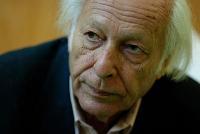 Isn't only about toppling the reigning dictators, but it is an enduring protest movement challenging, at the same time, both various dimensions of the internal social order, especially glaring inequalities in income distribution, and the international order, the place of Arab countries in the global economic order.
Isn't only about toppling the reigning dictators, but it is an enduring protest movement challenging, at the same time, both various dimensions of the internal social order, especially glaring inequalities in income distribution, and the international order, the place of Arab countries in the global economic order.
19.09.2011 | by Samir Amin
 David Adjaye, one of the leading architects from his generation, living between London and New York, returned to Lisbon. 'Urban Africa - A Photographic Journey' was the reason why. This exhibition, recently launched at the Black Pavilion of Lisbon City Hall Museum, is a photographic tour but also a retrospective of memories from an architect who never left Africa.
Born in 1966, in Tanzania, from a family of diplomats, he was soon forced to understand the inevitability of travelling, the need to readapt and redefine oneself. Nevertheless, the nomad lifestyle didn’t break his strong relation with the African continent. His work confirms his deep relationship with its landscapes and its places. In Urban Africa (and also in this conversation) David shares his panoramic view of this vast territory and his – spoken – will to live there again.
David Adjaye, one of the leading architects from his generation, living between London and New York, returned to Lisbon. 'Urban Africa - A Photographic Journey' was the reason why. This exhibition, recently launched at the Black Pavilion of Lisbon City Hall Museum, is a photographic tour but also a retrospective of memories from an architect who never left Africa.
Born in 1966, in Tanzania, from a family of diplomats, he was soon forced to understand the inevitability of travelling, the need to readapt and redefine oneself. Nevertheless, the nomad lifestyle didn’t break his strong relation with the African continent. His work confirms his deep relationship with its landscapes and its places. In Urban Africa (and also in this conversation) David shares his panoramic view of this vast territory and his – spoken – will to live there again.
01.06.2011 | by Rita Palma
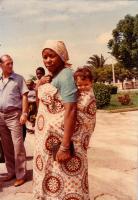 Why am I not black. Or rather, how did I end up a Mozambican?
These questions about identity are normal. They come up more often when I’m not in Mozambique due to (I assume) lack of historical knowledge. But what does a Mozambican look like? Mozambique, as a nation, didn’t exist until 1975. It was then it was born, a carrier of other nations within its borders, of ethnicities as varied as Shangana, Makonde, descendants from Swahili and Arabs from the North, descendants from Goan, Pakistani, Portuguese, Ronga and so on. With that new country came a new nationality — Mozambican.
Why am I not black. Or rather, how did I end up a Mozambican?
These questions about identity are normal. They come up more often when I’m not in Mozambique due to (I assume) lack of historical knowledge. But what does a Mozambican look like? Mozambique, as a nation, didn’t exist until 1975. It was then it was born, a carrier of other nations within its borders, of ethnicities as varied as Shangana, Makonde, descendants from Swahili and Arabs from the North, descendants from Goan, Pakistani, Portuguese, Ronga and so on. With that new country came a new nationality — Mozambican.
27.04.2011 | by Rui Tenreiro
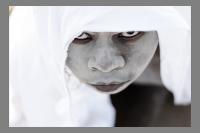 Mário Macilau is a photographer (of fragments) of reality. Macilau is a teller of stories and as he narrates he meditates through his images on the social, political and economic environment in his country and in the world, which he explores in its unfeigned naked and raw form. As he states himself, he does not stage or create the photographic moment. His images are instantaneous. He does not seek them, he finds them. Camera in hand, he approaches the countless anonymous people who appear in his work – it is the movement of contemporary man and his relationship with space that interest him.
Mário Macilau is a photographer (of fragments) of reality. Macilau is a teller of stories and as he narrates he meditates through his images on the social, political and economic environment in his country and in the world, which he explores in its unfeigned naked and raw form. As he states himself, he does not stage or create the photographic moment. His images are instantaneous. He does not seek them, he finds them. Camera in hand, he approaches the countless anonymous people who appear in his work – it is the movement of contemporary man and his relationship with space that interest him.
11.04.2011 | by Sílvia Vieira
 Interview carried out by online chat, at various times and on various days, punctuated by continual breaks in the Internet connection that maps out the transatlantic and ex-colonial triangulation between Luanda, Angola – Kiluanji Kia Henda’s home, a city that I have never visited; São Paulo, Brazil – my temporary home and the place where I first met Kiluanji, a place that is close to the origin of the series presented here; Lisbon, Portugal – my permanent home, source of the schedule drawn up by my computer and Kiluanji’s ex-temporary home.
Interview carried out by online chat, at various times and on various days, punctuated by continual breaks in the Internet connection that maps out the transatlantic and ex-colonial triangulation between Luanda, Angola – Kiluanji Kia Henda’s home, a city that I have never visited; São Paulo, Brazil – my temporary home and the place where I first met Kiluanji, a place that is close to the origin of the series presented here; Lisbon, Portugal – my permanent home, source of the schedule drawn up by my computer and Kiluanji’s ex-temporary home.
08.04.2011 | by Lígia Afonso
 Passando tempo no mercado, a Feira do Ponto da cidade de São Tomé, Olavo pintou várias séries de quadros com vendedoras. Falava com elas enquanto desenhava esboços, retratou-as na sua vida pública de trabalho. Na tela, as mulheres, cestos e bacias à cabeça, crianças nas costas, a luta diária: ganhar a vida, cuidar da família. O confronto com a vivência quotidiana das vendedoras sobrepôs-se ao seu impacto figurativo e os contornos das mulheres emanciparam-se para delinear os estreitos corredores do mercado. As mulheres moldaram-se nos trajectos repisados por elas todos os dias, e mais tarde os trajectos devolveram-se às mulheres na multiplicidade dos seus caminhos interiores, mais extensos e complexos.
Passando tempo no mercado, a Feira do Ponto da cidade de São Tomé, Olavo pintou várias séries de quadros com vendedoras. Falava com elas enquanto desenhava esboços, retratou-as na sua vida pública de trabalho. Na tela, as mulheres, cestos e bacias à cabeça, crianças nas costas, a luta diária: ganhar a vida, cuidar da família. O confronto com a vivência quotidiana das vendedoras sobrepôs-se ao seu impacto figurativo e os contornos das mulheres emanciparam-se para delinear os estreitos corredores do mercado. As mulheres moldaram-se nos trajectos repisados por elas todos os dias, e mais tarde os trajectos devolveram-se às mulheres na multiplicidade dos seus caminhos interiores, mais extensos e complexos.
15.03.2011 | by Nuno Milagre
 While it is true that African art largely takes place in the Northern hemisphere, and while its major (political, financial, philosophical, aesthetic etc.) advances have taken place here, it is true that the African continent is increasingly asserting itself as an exceptional relational space for cultural agents.
While it is true that African art largely takes place in the Northern hemisphere, and while its major (political, financial, philosophical, aesthetic etc.) advances have taken place here, it is true that the African continent is increasingly asserting itself as an exceptional relational space for cultural agents.
28.02.2011 | by Marta Mestre
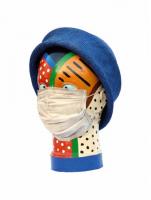 To interpret what it means to be a traveller – in present day terms – is a multifaceted exercise, put in the spotlight even further by the geography and culture that define the point of departure and that of arrival. Human “latitude” is what you find between the distance travelled from the beginning to the end. For many, it’s an agent provocateur that creates a field of artistic and intellectual experimentation where the force of innocuous space takes us to all sorts of exchanges and the construction of new concepts.
To interpret what it means to be a traveller – in present day terms – is a multifaceted exercise, put in the spotlight even further by the geography and culture that define the point of departure and that of arrival. Human “latitude” is what you find between the distance travelled from the beginning to the end. For many, it’s an agent provocateur that creates a field of artistic and intellectual experimentation where the force of innocuous space takes us to all sorts of exchanges and the construction of new concepts.
02.01.2011 | by Jorge Rocha
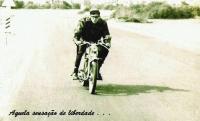 The beard was long and white and the hair long too but flowing loose. The face was burnt by the sun and an enormous love for the Namibe desert, where he had spent his childhood . He had been enchanted by the dunes, which looked to him like mountains of gold glittering in the distance. Samuel Aço is the main force behind the Centro de Estudos do Deserto (Centre for Desert Studies). This is an association in the heart of Namibe, in southern Angola, delving into the secrets of one of the country's most inhospitable regions.
The beard was long and white and the hair long too but flowing loose. The face was burnt by the sun and an enormous love for the Namibe desert, where he had spent his childhood . He had been enchanted by the dunes, which looked to him like mountains of gold glittering in the distance. Samuel Aço is the main force behind the Centro de Estudos do Deserto (Centre for Desert Studies). This is an association in the heart of Namibe, in southern Angola, delving into the secrets of one of the country's most inhospitable regions.
09.12.2010 | by Pedro Cardoso
 Meirinho has a voice which conveys conviction, the look in his eye is steadfast, his body unflinching, though bursting at times with a provocative impetuosity. He is an actor with great vitality: his energy spills over and has to be worked on with the discipline that the theatre demands. And this at times is difficult because Meirinho is, as a person, over the top. But this very feature, channelled into the theatre, can give birth to genius.
Meirinho has a voice which conveys conviction, the look in his eye is steadfast, his body unflinching, though bursting at times with a provocative impetuosity. He is an actor with great vitality: his energy spills over and has to be worked on with the discipline that the theatre demands. And this at times is difficult because Meirinho is, as a person, over the top. But this very feature, channelled into the theatre, can give birth to genius.
29.11.2010 | by Marta Lança
 n his new exhibition project In the skin of the city (Na pele da cidade) António Ole talks about space. It is about his hometown Luanda, but could be any other city as well. A place, where he stopped on one of his many travels, to absorb it's particularity. To absorb and let it be inscribed into his very own skin. In the past years he has seen many places during his travels for various exhibitions in the international art-world.
n his new exhibition project In the skin of the city (Na pele da cidade) António Ole talks about space. It is about his hometown Luanda, but could be any other city as well. A place, where he stopped on one of his many travels, to absorb it's particularity. To absorb and let it be inscribed into his very own skin. In the past years he has seen many places during his travels for various exhibitions in the international art-world.
27.11.2010 | by Nadine Siegert
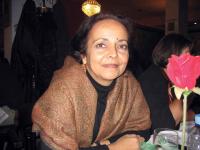 born in Huíla, in the midst of an unjust colonial society. There were pastors there. What I owe to the Nyaneka society is poetry, music, the sense of smell, southern orientation. Contact (for anyone in the process of assimilation) was forbidden to us. And it was for this very reason stronger. To learn and to know who they were and who we were was always linked to the paradigm of orality, the flame that wells from being of a place, being aware of the cycles, respect for difference, and an abhorrence of injustice.
born in Huíla, in the midst of an unjust colonial society. There were pastors there. What I owe to the Nyaneka society is poetry, music, the sense of smell, southern orientation. Contact (for anyone in the process of assimilation) was forbidden to us. And it was for this very reason stronger. To learn and to know who they were and who we were was always linked to the paradigm of orality, the flame that wells from being of a place, being aware of the cycles, respect for difference, and an abhorrence of injustice.
07.11.2010 | by Pedro Cardoso
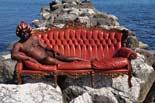 Fonti Gallery presents the second solo exhibition of the Angolan photographer Kiluanji Kia Henda. The show is a project developed by the artist between Venice and Luanda in the framework of the international residency programme Art Enclosures produced and created by Fondazione Venezia and organized in collaboration with Polymnia and Bevilacqua La Masa Foundation in Venice.
Fonti Gallery presents the second solo exhibition of the Angolan photographer Kiluanji Kia Henda. The show is a project developed by the artist between Venice and Luanda in the framework of the international residency programme Art Enclosures produced and created by Fondazione Venezia and organized in collaboration with Polymnia and Bevilacqua La Masa Foundation in Venice.
21.10.2010 | by Kiluanji Kia Henda
 Paulo Flores is a musician, singer and composer. In terms of music in Angola, his voice is unmistakable. His career spans 20 years, he has made 11 records, he has placed his stamp on Angolan music, and he has renovated Angolan culture. His music pays tribute to his homeland, his lyrics put him in the vanguard. His last work is the trilogy “ExCombatentes” (Veterans). The three parts (“Viagem” (Journey), “Sembas” (Semba Music) ande “Ilhas” (Islands) is nothing short of a virtuoso display of talent.
Paulo Flores is a musician, singer and composer. In terms of music in Angola, his voice is unmistakable. His career spans 20 years, he has made 11 records, he has placed his stamp on Angolan music, and he has renovated Angolan culture. His music pays tribute to his homeland, his lyrics put him in the vanguard. His last work is the trilogy “ExCombatentes” (Veterans). The three parts (“Viagem” (Journey), “Sembas” (Semba Music) ande “Ilhas” (Islands) is nothing short of a virtuoso display of talent.
21.10.2010 | by Marta Lança
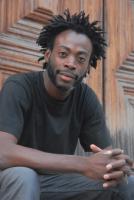 When it comes to being black, they are much more open minded and the struggle for work is taken seriously. They still complain, of course. But the difference is that a black actor in Brazil is a Brazilian, but in Portugal you feel like an immigrant - and how! If we are excluded from all sectors of society, what can we do? But there’s the other side of the coin: what do black actors do to counteract this situation?
When it comes to being black, they are much more open minded and the struggle for work is taken seriously. They still complain, of course. But the difference is that a black actor in Brazil is a Brazilian, but in Portugal you feel like an immigrant - and how! If we are excluded from all sectors of society, what can we do? But there’s the other side of the coin: what do black actors do to counteract this situation?
11.10.2010 | by Marta Lança
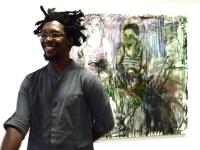 "René Tavares translates lines, dashes, blots, a personal synthesis of his own identity always in process (“unfinished”) set in constant movement in between past and present references".
The last exhibition at Galeria Bozart (Lisbon).
"René Tavares translates lines, dashes, blots, a personal synthesis of his own identity always in process (“unfinished”) set in constant movement in between past and present references".
The last exhibition at Galeria Bozart (Lisbon).
07.10.2010 | by Lúcia Marques
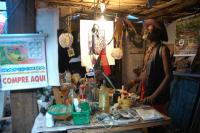 Mestre Paulo Kapela takes an exceptional position with his life and work within the artworld of Luanda, Angola's booming capital. The artist is a fugitive in his own country, a Mukongo from Uige and came to Luanda in 1996. Today he is a kind of artistic and spiritual master for the younger artist generation, even if he barely speaks Portuguese, but French. He became a role model with his unorthodox way of living and his personal universe, but also with his unique way of art-production through a combination of disparate objects and the creation of new contexts.
Mestre Paulo Kapela takes an exceptional position with his life and work within the artworld of Luanda, Angola's booming capital. The artist is a fugitive in his own country, a Mukongo from Uige and came to Luanda in 1996. Today he is a kind of artistic and spiritual master for the younger artist generation, even if he barely speaks Portuguese, but French. He became a role model with his unorthodox way of living and his personal universe, but also with his unique way of art-production through a combination of disparate objects and the creation of new contexts.
23.09.2010 | by Nadine Siegert
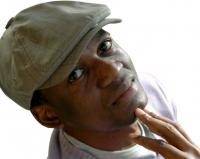 The book has received critical acclaim as a work by an African writing soberly on “such things”, in “journalistic language, backed by rigorous research.” It is a first in terms of its internal discourse, since it provides us “with a view of an African thinker and fighter from an African perspective."
The book has received critical acclaim as a work by an African writing soberly on “such things”, in “journalistic language, backed by rigorous research.” It is a first in terms of its internal discourse, since it provides us “with a view of an African thinker and fighter from an African perspective."
18.09.2010 | by Marta Lança
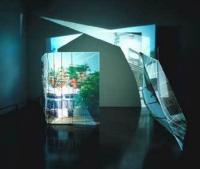 The concept of nationality is not that important to me. I relate very strongly with territories, that is. And I have a strong relationship with Africa, particularly southern Africa, including where I was born, Mozambique, and South Africa, and this Iberian corner of Europe. If I had to define myself culturally in terms of identity, it is somewhere between these two areas of the world that references to my person are found.
The concept of nationality is not that important to me. I relate very strongly with territories, that is. And I have a strong relationship with Africa, particularly southern Africa, including where I was born, Mozambique, and South Africa, and this Iberian corner of Europe. If I had to define myself culturally in terms of identity, it is somewhere between these two areas of the world that references to my person are found.
13.09.2010 | by Lúcia Ramos Monteiro
 is craft comes from experience, from much observation, but it’s as if he had been there before. On top of this, he often repeats that there is a cultural sense to making clothes, like a gesture that happens every day but goes back to the very roots of humanity. “It all comes from the divine idea that “Adam sewed leaves and God sewed skins.” Sewing is also cultural. In all families and in all societies we come across those who have this strong cultural element. It’s like learning how to make home-made bread.”
is craft comes from experience, from much observation, but it’s as if he had been there before. On top of this, he often repeats that there is a cultural sense to making clothes, like a gesture that happens every day but goes back to the very roots of humanity. “It all comes from the divine idea that “Adam sewed leaves and God sewed skins.” Sewing is also cultural. In all families and in all societies we come across those who have this strong cultural element. It’s like learning how to make home-made bread.”
08.09.2010 | by Marta Lança
 Isn't only about toppling the reigning dictators, but it is an enduring protest movement challenging, at the same time, both various dimensions of the internal social order, especially glaring inequalities in income distribution, and the international order, the place of Arab countries in the global economic order.
Isn't only about toppling the reigning dictators, but it is an enduring protest movement challenging, at the same time, both various dimensions of the internal social order, especially glaring inequalities in income distribution, and the international order, the place of Arab countries in the global economic order.  David Adjaye, one of the leading architects from his generation, living between London and New York, returned to Lisbon. 'Urban Africa - A Photographic Journey' was the reason why. This exhibition, recently launched at the Black Pavilion of Lisbon City Hall Museum, is a photographic tour but also a retrospective of memories from an architect who never left Africa.
Born in 1966, in Tanzania, from a family of diplomats, he was soon forced to understand the inevitability of travelling, the need to readapt and redefine oneself. Nevertheless, the nomad lifestyle didn’t break his strong relation with the African continent. His work confirms his deep relationship with its landscapes and its places. In Urban Africa (and also in this conversation) David shares his panoramic view of this vast territory and his – spoken – will to live there again.
David Adjaye, one of the leading architects from his generation, living between London and New York, returned to Lisbon. 'Urban Africa - A Photographic Journey' was the reason why. This exhibition, recently launched at the Black Pavilion of Lisbon City Hall Museum, is a photographic tour but also a retrospective of memories from an architect who never left Africa.
Born in 1966, in Tanzania, from a family of diplomats, he was soon forced to understand the inevitability of travelling, the need to readapt and redefine oneself. Nevertheless, the nomad lifestyle didn’t break his strong relation with the African continent. His work confirms his deep relationship with its landscapes and its places. In Urban Africa (and also in this conversation) David shares his panoramic view of this vast territory and his – spoken – will to live there again.  Why am I not black. Or rather, how did I end up a Mozambican?
These questions about identity are normal. They come up more often when I’m not in Mozambique due to (I assume) lack of historical knowledge. But what does a Mozambican look like? Mozambique, as a nation, didn’t exist until 1975. It was then it was born, a carrier of other nations within its borders, of ethnicities as varied as Shangana, Makonde, descendants from Swahili and Arabs from the North, descendants from Goan, Pakistani, Portuguese, Ronga and so on. With that new country came a new nationality — Mozambican.
Why am I not black. Or rather, how did I end up a Mozambican?
These questions about identity are normal. They come up more often when I’m not in Mozambique due to (I assume) lack of historical knowledge. But what does a Mozambican look like? Mozambique, as a nation, didn’t exist until 1975. It was then it was born, a carrier of other nations within its borders, of ethnicities as varied as Shangana, Makonde, descendants from Swahili and Arabs from the North, descendants from Goan, Pakistani, Portuguese, Ronga and so on. With that new country came a new nationality — Mozambican.  Mário Macilau is a photographer (of fragments) of reality. Macilau is a teller of stories and as he narrates he meditates through his images on the social, political and economic environment in his country and in the world, which he explores in its unfeigned naked and raw form. As he states himself, he does not stage or create the photographic moment. His images are instantaneous. He does not seek them, he finds them. Camera in hand, he approaches the countless anonymous people who appear in his work – it is the movement of contemporary man and his relationship with space that interest him.
Mário Macilau is a photographer (of fragments) of reality. Macilau is a teller of stories and as he narrates he meditates through his images on the social, political and economic environment in his country and in the world, which he explores in its unfeigned naked and raw form. As he states himself, he does not stage or create the photographic moment. His images are instantaneous. He does not seek them, he finds them. Camera in hand, he approaches the countless anonymous people who appear in his work – it is the movement of contemporary man and his relationship with space that interest him.  Interview carried out by online chat, at various times and on various days, punctuated by continual breaks in the Internet connection that maps out the transatlantic and ex-colonial triangulation between Luanda, Angola – Kiluanji Kia Henda’s home, a city that I have never visited; São Paulo, Brazil – my temporary home and the place where I first met Kiluanji, a place that is close to the origin of the series presented here; Lisbon, Portugal – my permanent home, source of the schedule drawn up by my computer and Kiluanji’s ex-temporary home.
Interview carried out by online chat, at various times and on various days, punctuated by continual breaks in the Internet connection that maps out the transatlantic and ex-colonial triangulation between Luanda, Angola – Kiluanji Kia Henda’s home, a city that I have never visited; São Paulo, Brazil – my temporary home and the place where I first met Kiluanji, a place that is close to the origin of the series presented here; Lisbon, Portugal – my permanent home, source of the schedule drawn up by my computer and Kiluanji’s ex-temporary home.  Passando tempo no mercado, a Feira do Ponto da cidade de São Tomé, Olavo pintou várias séries de quadros com vendedoras. Falava com elas enquanto desenhava esboços, retratou-as na sua vida pública de trabalho. Na tela, as mulheres, cestos e bacias à cabeça, crianças nas costas, a luta diária: ganhar a vida, cuidar da família. O confronto com a vivência quotidiana das vendedoras sobrepôs-se ao seu impacto figurativo e os contornos das mulheres emanciparam-se para delinear os estreitos corredores do mercado. As mulheres moldaram-se nos trajectos repisados por elas todos os dias, e mais tarde os trajectos devolveram-se às mulheres na multiplicidade dos seus caminhos interiores, mais extensos e complexos.
Passando tempo no mercado, a Feira do Ponto da cidade de São Tomé, Olavo pintou várias séries de quadros com vendedoras. Falava com elas enquanto desenhava esboços, retratou-as na sua vida pública de trabalho. Na tela, as mulheres, cestos e bacias à cabeça, crianças nas costas, a luta diária: ganhar a vida, cuidar da família. O confronto com a vivência quotidiana das vendedoras sobrepôs-se ao seu impacto figurativo e os contornos das mulheres emanciparam-se para delinear os estreitos corredores do mercado. As mulheres moldaram-se nos trajectos repisados por elas todos os dias, e mais tarde os trajectos devolveram-se às mulheres na multiplicidade dos seus caminhos interiores, mais extensos e complexos.  While it is true that African art largely takes place in the Northern hemisphere, and while its major (political, financial, philosophical, aesthetic etc.) advances have taken place here, it is true that the African continent is increasingly asserting itself as an exceptional relational space for cultural agents.
While it is true that African art largely takes place in the Northern hemisphere, and while its major (political, financial, philosophical, aesthetic etc.) advances have taken place here, it is true that the African continent is increasingly asserting itself as an exceptional relational space for cultural agents.
 To interpret what it means to be a traveller – in present day terms – is a multifaceted exercise, put in the spotlight even further by the geography and culture that define the point of departure and that of arrival. Human “latitude” is what you find between the distance travelled from the beginning to the end. For many, it’s an agent provocateur that creates a field of artistic and intellectual experimentation where the force of innocuous space takes us to all sorts of exchanges and the construction of new concepts.
To interpret what it means to be a traveller – in present day terms – is a multifaceted exercise, put in the spotlight even further by the geography and culture that define the point of departure and that of arrival. Human “latitude” is what you find between the distance travelled from the beginning to the end. For many, it’s an agent provocateur that creates a field of artistic and intellectual experimentation where the force of innocuous space takes us to all sorts of exchanges and the construction of new concepts.  The beard was long and white and the hair long too but flowing loose. The face was burnt by the sun and an enormous love for the Namibe desert, where he had spent his childhood . He had been enchanted by the dunes, which looked to him like mountains of gold glittering in the distance. Samuel Aço is the main force behind the Centro de Estudos do Deserto (Centre for Desert Studies). This is an association in the heart of Namibe, in southern Angola, delving into the secrets of one of the country's most inhospitable regions.
The beard was long and white and the hair long too but flowing loose. The face was burnt by the sun and an enormous love for the Namibe desert, where he had spent his childhood . He had been enchanted by the dunes, which looked to him like mountains of gold glittering in the distance. Samuel Aço is the main force behind the Centro de Estudos do Deserto (Centre for Desert Studies). This is an association in the heart of Namibe, in southern Angola, delving into the secrets of one of the country's most inhospitable regions.  Meirinho has a voice which conveys conviction, the look in his eye is steadfast, his body unflinching, though bursting at times with a provocative impetuosity. He is an actor with great vitality: his energy spills over and has to be worked on with the discipline that the theatre demands. And this at times is difficult because Meirinho is, as a person, over the top. But this very feature, channelled into the theatre, can give birth to genius.
Meirinho has a voice which conveys conviction, the look in his eye is steadfast, his body unflinching, though bursting at times with a provocative impetuosity. He is an actor with great vitality: his energy spills over and has to be worked on with the discipline that the theatre demands. And this at times is difficult because Meirinho is, as a person, over the top. But this very feature, channelled into the theatre, can give birth to genius.  born in Huíla, in the midst of an unjust colonial society. There were pastors there. What I owe to the Nyaneka society is poetry, music, the sense of smell, southern orientation. Contact (for anyone in the process of assimilation) was forbidden to us. And it was for this very reason stronger. To learn and to know who they were and who we were was always linked to the paradigm of orality, the flame that wells from being of a place, being aware of the cycles, respect for difference, and an abhorrence of injustice.
born in Huíla, in the midst of an unjust colonial society. There were pastors there. What I owe to the Nyaneka society is poetry, music, the sense of smell, southern orientation. Contact (for anyone in the process of assimilation) was forbidden to us. And it was for this very reason stronger. To learn and to know who they were and who we were was always linked to the paradigm of orality, the flame that wells from being of a place, being aware of the cycles, respect for difference, and an abhorrence of injustice.  Fonti Gallery presents the second solo exhibition of the Angolan photographer Kiluanji Kia Henda. The show is a project developed by the artist between Venice and Luanda in the framework of the international residency programme Art Enclosures produced and created by Fondazione Venezia and organized in collaboration with Polymnia and Bevilacqua La Masa Foundation in Venice.
Fonti Gallery presents the second solo exhibition of the Angolan photographer Kiluanji Kia Henda. The show is a project developed by the artist between Venice and Luanda in the framework of the international residency programme Art Enclosures produced and created by Fondazione Venezia and organized in collaboration with Polymnia and Bevilacqua La Masa Foundation in Venice.  Paulo Flores is a musician, singer and composer. In terms of music in Angola, his voice is unmistakable. His career spans 20 years, he has made 11 records, he has placed his stamp on Angolan music, and he has renovated Angolan culture. His music pays tribute to his homeland, his lyrics put him in the vanguard. His last work is the trilogy “ExCombatentes” (Veterans). The three parts (“Viagem” (Journey), “Sembas” (Semba Music) ande “Ilhas” (Islands) is nothing short of a virtuoso display of talent.
Paulo Flores is a musician, singer and composer. In terms of music in Angola, his voice is unmistakable. His career spans 20 years, he has made 11 records, he has placed his stamp on Angolan music, and he has renovated Angolan culture. His music pays tribute to his homeland, his lyrics put him in the vanguard. His last work is the trilogy “ExCombatentes” (Veterans). The three parts (“Viagem” (Journey), “Sembas” (Semba Music) ande “Ilhas” (Islands) is nothing short of a virtuoso display of talent.
 When it comes to being black, they are much more open minded and the struggle for work is taken seriously. They still complain, of course. But the difference is that a black actor in Brazil is a Brazilian, but in Portugal you feel like an immigrant - and how! If we are excluded from all sectors of society, what can we do? But there’s the other side of the coin: what do black actors do to counteract this situation?
When it comes to being black, they are much more open minded and the struggle for work is taken seriously. They still complain, of course. But the difference is that a black actor in Brazil is a Brazilian, but in Portugal you feel like an immigrant - and how! If we are excluded from all sectors of society, what can we do? But there’s the other side of the coin: what do black actors do to counteract this situation?  "René Tavares translates lines, dashes, blots, a personal synthesis of his own identity always in process (“unfinished”) set in constant movement in between past and present references".
The last exhibition at Galeria Bozart (Lisbon).
"René Tavares translates lines, dashes, blots, a personal synthesis of his own identity always in process (“unfinished”) set in constant movement in between past and present references".
The last exhibition at Galeria Bozart (Lisbon).  Mestre Paulo Kapela takes an exceptional position with his life and work within the artworld of Luanda, Angola's booming capital. The artist is a fugitive in his own country, a Mukongo from Uige and came to Luanda in 1996. Today he is a kind of artistic and spiritual master for the younger artist generation, even if he barely speaks Portuguese, but French. He became a role model with his unorthodox way of living and his personal universe, but also with his unique way of art-production through a combination of disparate objects and the creation of new contexts.
Mestre Paulo Kapela takes an exceptional position with his life and work within the artworld of Luanda, Angola's booming capital. The artist is a fugitive in his own country, a Mukongo from Uige and came to Luanda in 1996. Today he is a kind of artistic and spiritual master for the younger artist generation, even if he barely speaks Portuguese, but French. He became a role model with his unorthodox way of living and his personal universe, but also with his unique way of art-production through a combination of disparate objects and the creation of new contexts.  The book has received critical acclaim as a work by an African writing soberly on “such things”, in “journalistic language, backed by rigorous research.” It is a first in terms of its internal discourse, since it provides us “with a view of an African thinker and fighter from an African perspective."
The book has received critical acclaim as a work by an African writing soberly on “such things”, in “journalistic language, backed by rigorous research.” It is a first in terms of its internal discourse, since it provides us “with a view of an African thinker and fighter from an African perspective."  The concept of nationality is not that important to me. I relate very strongly with territories, that is. And I have a strong relationship with Africa, particularly southern Africa, including where I was born, Mozambique, and South Africa, and this Iberian corner of Europe. If I had to define myself culturally in terms of identity, it is somewhere between these two areas of the world that references to my person are found.
The concept of nationality is not that important to me. I relate very strongly with territories, that is. And I have a strong relationship with Africa, particularly southern Africa, including where I was born, Mozambique, and South Africa, and this Iberian corner of Europe. If I had to define myself culturally in terms of identity, it is somewhere between these two areas of the world that references to my person are found.  is craft comes from experience, from much observation, but it’s as if he had been there before. On top of this, he often repeats that there is a cultural sense to making clothes, like a gesture that happens every day but goes back to the very roots of humanity. “It all comes from the divine idea that “Adam sewed leaves and God sewed skins.” Sewing is also cultural. In all families and in all societies we come across those who have this strong cultural element. It’s like learning how to make home-made bread.”
is craft comes from experience, from much observation, but it’s as if he had been there before. On top of this, he often repeats that there is a cultural sense to making clothes, like a gesture that happens every day but goes back to the very roots of humanity. “It all comes from the divine idea that “Adam sewed leaves and God sewed skins.” Sewing is also cultural. In all families and in all societies we come across those who have this strong cultural element. It’s like learning how to make home-made bread.” 